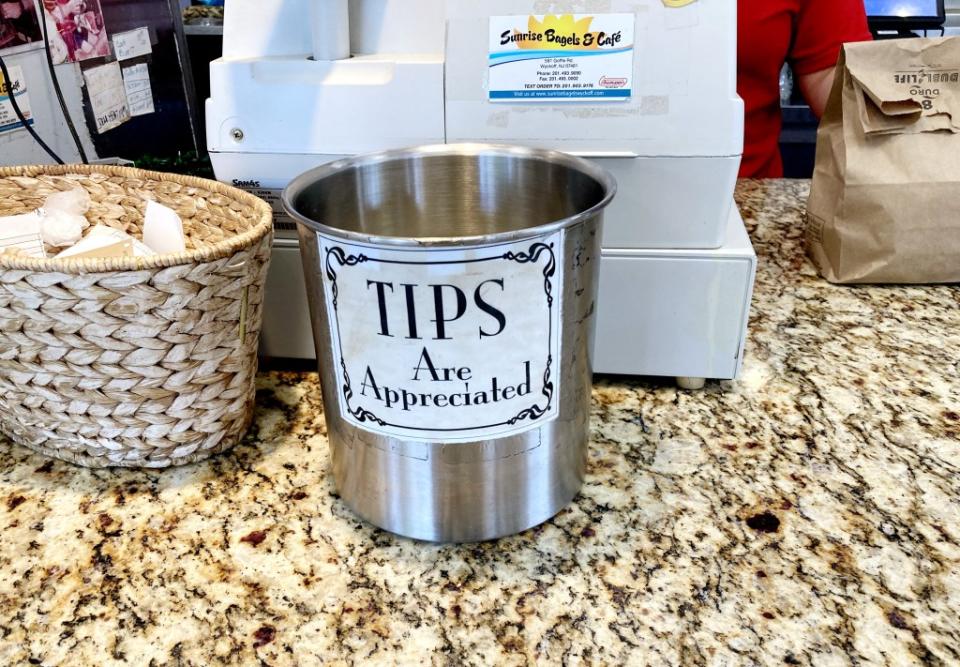NY restaurant owners say messing with rules on tipping will mean higher menu prices, possible layoffs: survey

New York restaurant owners have a tip for lawmakers: don’t change the rules about wait staff gratuity.
A whopping 95% of restaurateurs oppose a legislative campaign to eliminate the tip credit system that allows owners to pay wait staff who earn tips less than minimum wage, according to a new survey by the NYC Hospitality Alliance set to be released Monday.
Some owners said the change could lead to higher menu prices, staff layoffs — and could even threaten their businesses very existence.
“It’s clear New York’s restaurants and bars rely upon the tip credit,” said Andrew Rigie, executive director of the NYC Hospitality Alliance.
“There’s no reason for the state’s elected officials to upend the working model of New York’s restaurant industry and put small businesses and jobs on the chopping block, while making it much more expensive for New Yorkers and visitors to dine out in the Empire State,” Rigie said.
The survey or 879 restaurants, conducted in December, found that 97% of restaurants were extremely or somewhat concerned about eliminating the tip credit, with 88% saying it would be a disaster for their business.

Some 76% of restauranteurs said they’d increase menu prices to offset the big increase in expenses if they had to pay staff the $16 minimum wage and 42% would also consider eliminating tipping altogether to keep the overall cost down for customers as much as possible.
Two-thirds of eatery owners said they’d have to slash the number of workers they employ — as what happened when the District of Columbia ended the tip credit.
More than half of the restaurateurs — 54% — said they consider closing shop.
With the survey’s fundings, the Hospitality Alliance issued a report that said eliminating the tip credit would raise costs for restaurants and bars just as they’re starting to recover from the COVID-19 pandemic shutdowns and restructions.
The report also notes that restaurants were hit by post-pandemic inflation and remote work.
If the tip credit is eliminated, it will cost about $12,000 more to employ a full-time tipped employee per year, the report estimated.

Under current law, restaurant employers in NYC may pay workers who customarily receive tips a base wage of $10.65 per hour if that wage combined with their tips equals or exceeds $16 per hour, the current minimum wage.
The $5.35 differential is the “tip credit” for the service industry.
If the $10.65 base wage and the combined tips equals less than $16 per hour, the employer is required by law to pay the employee the difference.
Restaurant servers often make far more — upwards of $20 to $40 an hour with tips, the report said.
The Hospitality Alliance opposes legislation pushed by Assemblywoman Jessica Gonzalez-Rojas (D-Queens) and Sen. Robert Jackson (D-Manhattan) that would abolish the “tip credit” and have wait staff paid $17 an hour by 2026 if employed in the city, Long Island and Westchester, and be paid the minimum wage by 2027.
Gonzalez-Rojas said in her memo backing the bill, co-sponsored by 35 other Democrats, that current system creates inequities among workers.
“Reliance on tips has also created an environment where workers are victimized, and in some cases, encouraged to turn a blind eye, to rampant discrimination and sexual harassment by clientele and managers. This results in annual restaurant employee sexual harassment claims to the EEOC at five times the rate of other industries, ” the assemblywoman said.
Employers would not be prohibited from allowing for restaurant gratuities, but tip would no longer make up the difference between wages received from the restaurant and the actual minimum wage, she said.
Her bill would also allow tip sharing between wait staff and “back of house” roles, such as cooks and dishwashers, and those who do not receive tips.
A national organization, the Fair Wage Coalition, backs the legislation to end the tip credit.
“Passing the One Fair Wage bill and ending the subminimum wage for tipped workers would benefit restaurant employees and owners alike. Hundreds of thousands of working class people have left New York due to the high cost of living, creating a restaurant worker shortage that will have devastating long-term effects on the industry,” said Saru Jayaraman, president of the One Fair Wage coalition, said
The bill also provides a $50 million restaurant and restaurant worker recovery loan program to cover any short-term increased costs on employers, Jayaraman added.

 Yahoo News
Yahoo News 
